Unit 6 In a nature park 单元复习(三)-语法+典型例题(共41张PPT)
文档属性
| 名称 | Unit 6 In a nature park 单元复习(三)-语法+典型例题(共41张PPT) |
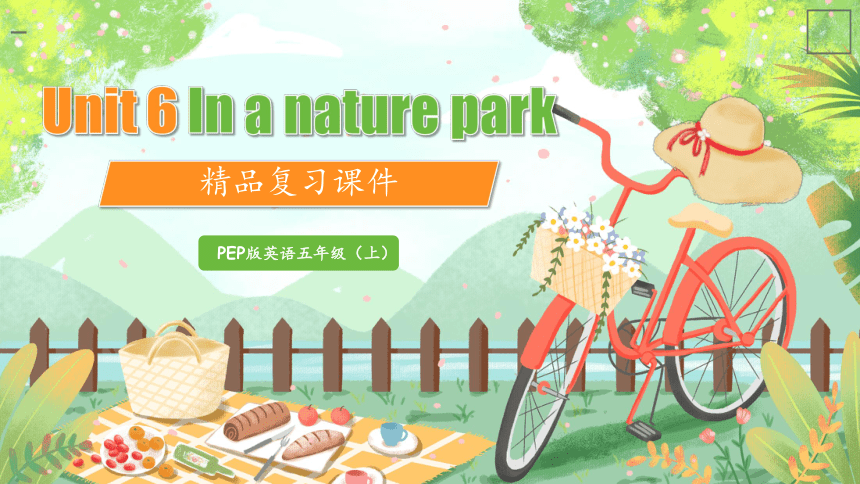
|
|
| 格式 | pptx | ||
| 文件大小 | 10.3MB | ||
| 资源类型 | 试卷 | ||
| 版本资源 | 人教版(PEP) | ||
| 科目 | 英语 | ||
| 更新时间 | 2024-08-16 09:23:42 | ||
图片预览

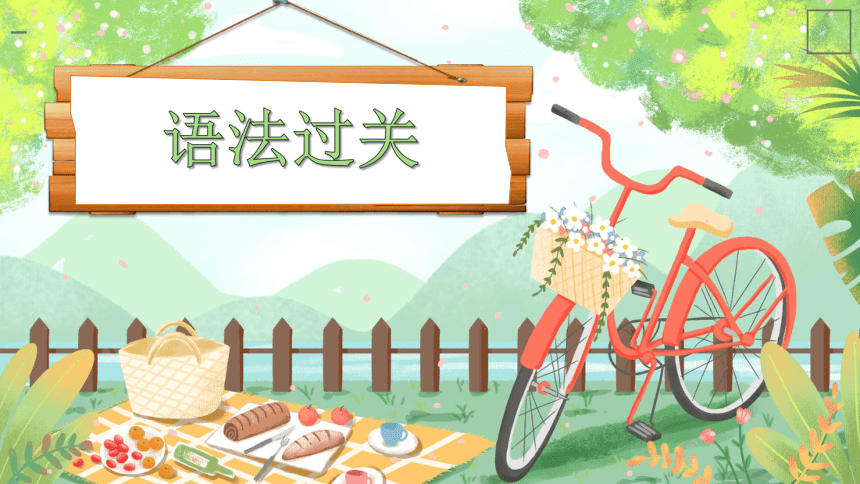
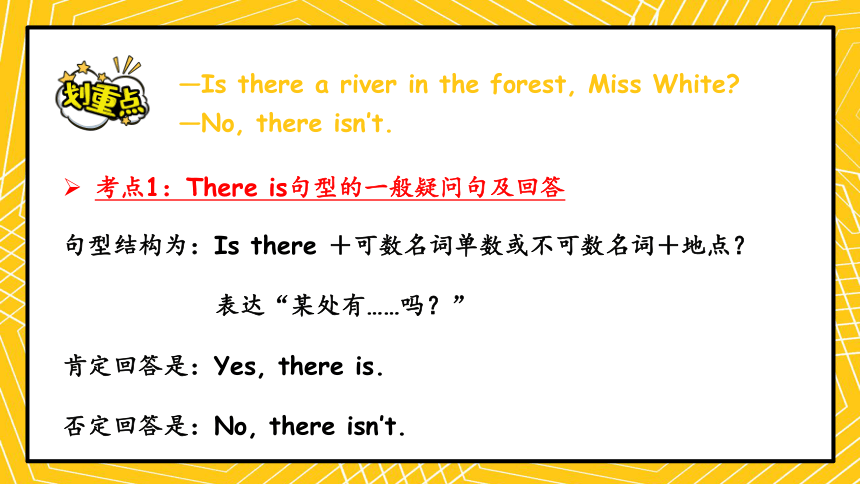
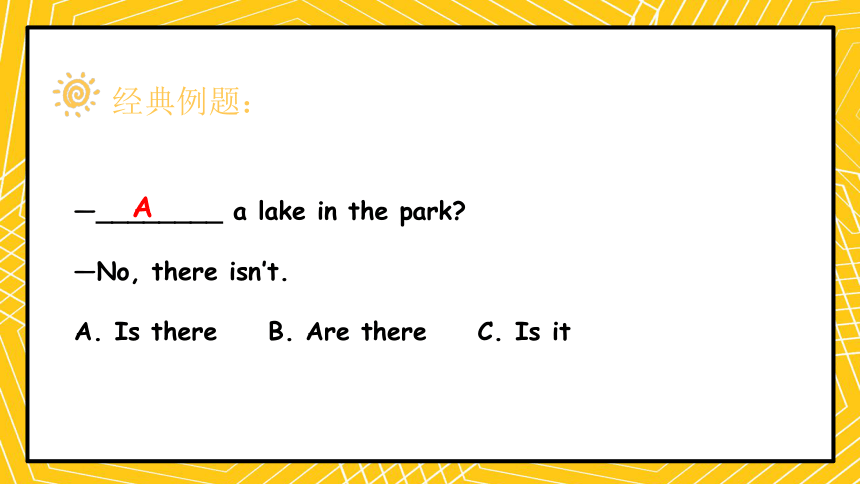
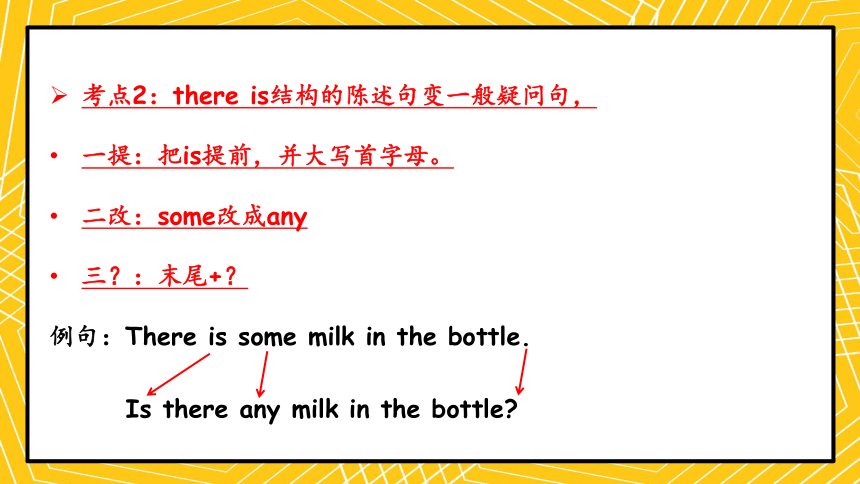
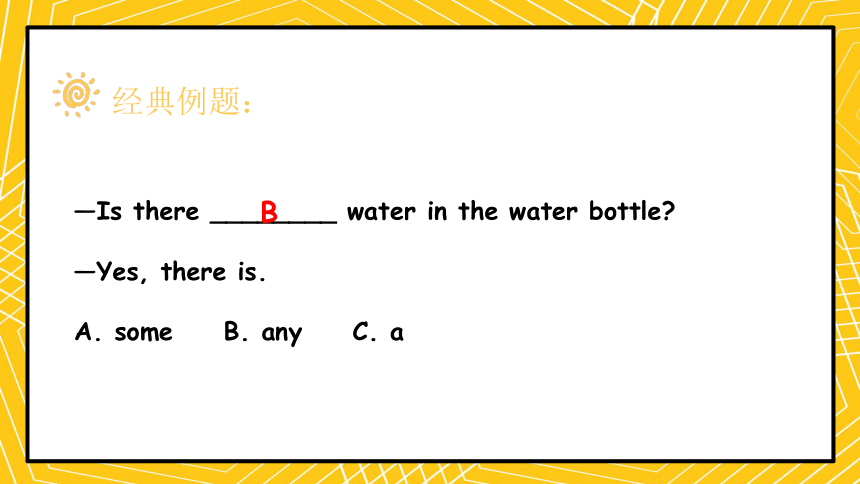
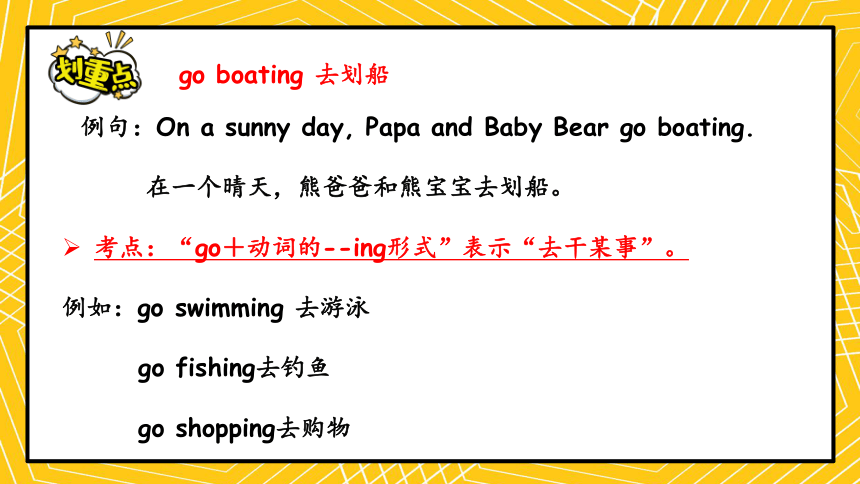
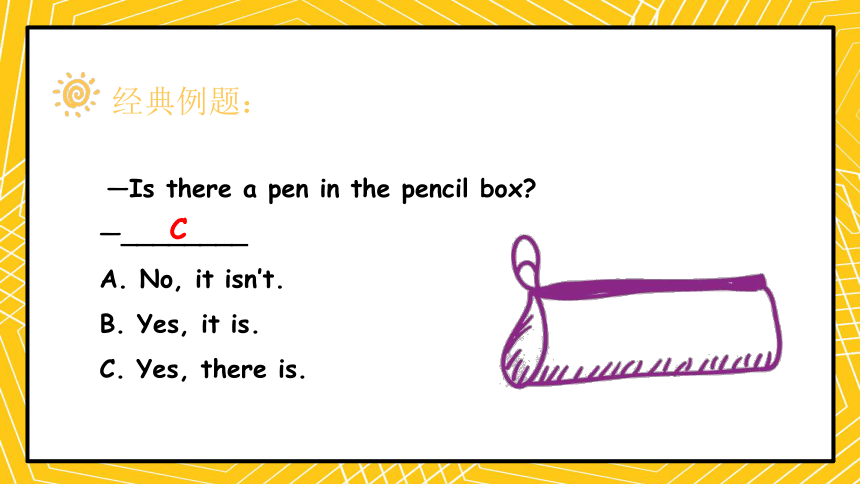
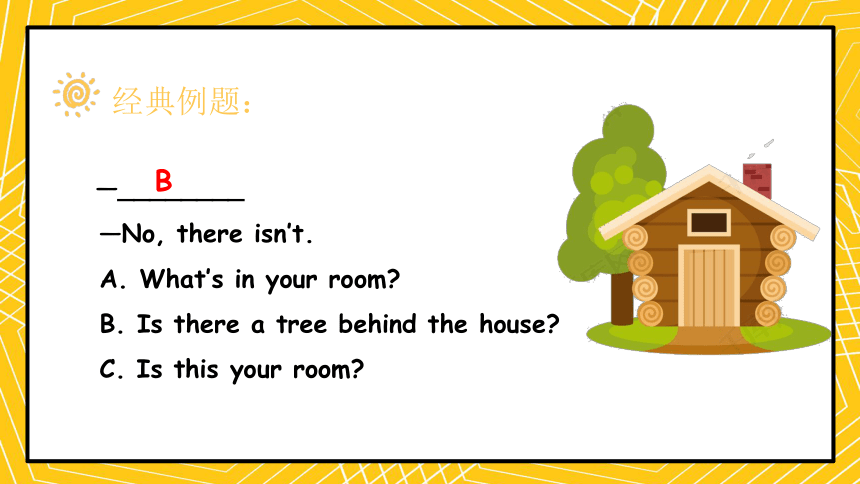
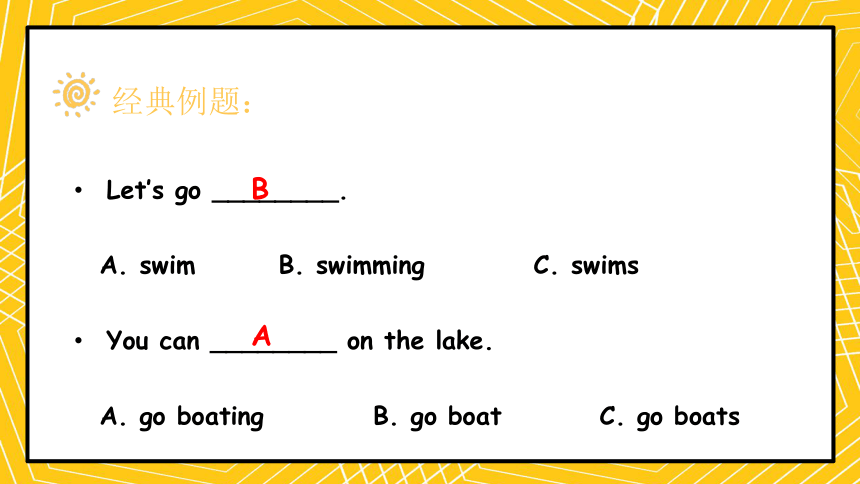
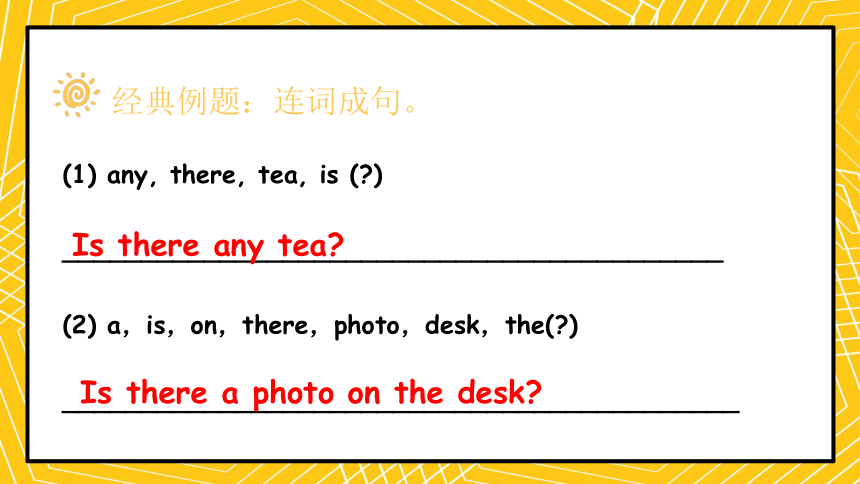
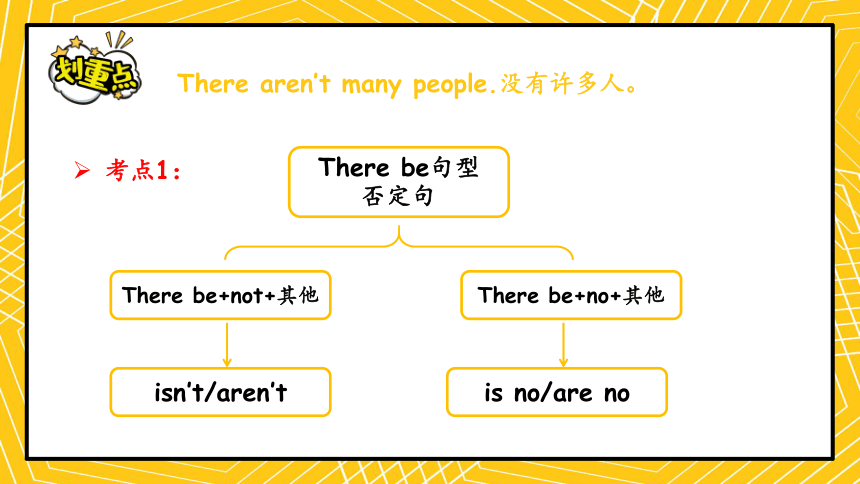
文档简介
(共41张PPT)
精品复习课件
PEP版英语五年级(上)
Unit 6 In a nature park
语法过关
考点1:There is句型的一般疑问句及回答
句型结构为:Is there +可数名词单数或不可数名词+地点?
表达“某处有……吗?”
肯定回答是:Yes, there is.
否定回答是:No, there isn’t.
—Is there a river in the forest, Miss White
—No, there isn’t.
—________ a lake in the park
—No, there isn’t.
A. Is there B. Are there C. Is it
经典例题:
A
考点2:there is结构的陈述句变一般疑问句,
一提:把is提前,并大写首字母。
二改:some改成any
三?:末尾+?
例句:There is some milk in the bottle.
Is there any milk in the bottle
—Is there ________ water in the water bottle
—Yes, there is.
A. some B. any C. a
经典例题:
B
例句:On a sunny day, Papa and Baby Bear go boating.
在一个晴天,熊爸爸和熊宝宝去划船。
考点:“go+动词的 -ing形式”表示“去干某事”。
例如:go swimming 去游泳
go fishing去钓鱼
go shopping去购物
go boating 去划船
—Is there a pen in the pencil box
—________
A. No, it isn’t.
B. Yes, it is.
C. Yes, there is.
经典例题:
C
—________
—No, there isn’t.
A. What’s in your room
B. Is there a tree behind the house
C. Is this your room
经典例题:
B
Let’s go ________.
A. swim B. swimming C. swims
You can ________ on the lake.
A. go boating B. go boat C. go boats
经典例题:
B
A
(1) any, there, tea, is ( )
__________________________________________
(2) a,is,on,there,photo,desk,the( )
___________________________________________
经典例题:连词成句。
Is there any tea
Is there a photo on the desk
There aren’t many people.没有许多人。
There be句型
否定句
There be+not+其他
There be+no+其他
isn’t/aren’t
is no/are no
考点1:
考点1:there be句型的否定句:
be+not /be+no
some 变 any
例句:There are some apples on the plate.
There aren’t any apples on the plate.
例句:
There isn't a nature park near the village.
村庄附近没有自然公园。
There aren't any ducks on the lake. 湖面上没有鸭子。
There is no mountain in the park. 公园里没有山。
There are no books on the desk. 书桌上没有书。
易错点1:
there be 句型的肯定句变否定句时,句中的
some 改为 any。any 用于否定句和疑问句中。
例句: There are some fish in the river.
There aren't any fish in the river.
易错点2:
no + 可数名词单数 = not a/an+ 可数名词单数
no + 可数名词复数 = not any + 可数名词复数
no +不可数名词 = not any + 不可数名词
考点2:本句中people是集合名词,后面不加 s。
意思 用法 例句
人 集体名词,本身就是复数,people做主语时,谓语动词用复数 The people in the village like eating fish.
民族 有单复数之分 There are 56 peoples in China.
There isn’t ________ milk in the bottle.
A. some B. any C. a
经典例题:
B
点拨:
此题句意为:瓶子里没有牛奶。因为milk是不可数名词,所以排除C;isn’t是否定词,所以排除A。
A. isn't B. aren't
① There___a lake in the park.
②There___any candies in the box.
③ There___an orange on the table.
经典例题:选一选。
A
B
B
①There are some small houses in the village.
______________________________________________
② There is a bridge above the river.
______________________________________________
③ There is some soup in the bowl.
______________________________________________
经典例题:把下列肯定句改为否定句。
There aren’t any small houses in the village.
There is no bridge above the river.
There isn’t any soup in the bowl.
A. people B. peoples
① There are five____in my family.我家有五口人。
② The Chinese____are hard-working. 中国人民是勤劳的。
③There are 56 ___ in China.中国有 56 个民族。
经典例题:选一选。
A
A
B
—Are there any tall buildings in the nature park
—No, there aren’t.
there are句型的一般疑问句及回答:
询问某地是否有某物,某物是可数名词的复数形式。
句型结构:Are there(+any)+可数名词的复数形式+地点?
肯定回答是:Yes, there are.
否定回答是:No, there aren’t.
—Are there any tall buildings in the nature park
—No, there aren’t.
考点1:there are句型的一般疑问句及回答:
询问某地是否有某物,某物是可数名词的复数形式。
句型结构:Are there(+any)+可数名词的复数形式+地点?
肯定回答是:Yes, there are.
否定回答是:No, there aren’t.
—Are there any tall buildings in the nature park
—No, there aren’t.
例句:—Are there any ducks in the river
河里有一些鸭子吗?
—Yes, there are.
是的,有。
—Are there any tall buildings in the nature park
—No, there aren’t.
考点1:there are句型的肯定句变一般疑问句的变化规律
are提到there前面,
some变为any。
例句:There are some birds in the forest.
Are there any birds in the forest
1. There is a clock on the desk.
_______________________________________
2. There are some pencils in my pencil box.
_______________________________________
经典例题:把下列肯定句改为否定句。
There isn’t a clock on the desk.
There aren’t any pencils in my pencil box.
1. any, there, cars, aren’t (.)
_____________________________________________
2. isn’t, a, the, river, there, in, park (.)
_____________________________________________
2. are, pictures, there, any, the, wall, on ( )
_____________________________________________
经典例题:连词成句。
There aren’t any cars.
There isn’t a river in the park.
Are there any pictures on the wall
—Are there ________ flowers in the park
—Yes, there are.
A. a B. any C. some
经典例题:单项选择。
B
How many 多少个
此句型在这里是省略句,完整的句子应该是:
How many lakes are there in the park
考点:how many 询问数量
用于询问可数名词的数量。在对话双方都知道询问的对象时,可以直接用 how many 提问。
How many 多少个
句型: How many(+可数名词复数-+其他)
例句:-Are there any birds in the tree 树上有鸟吗
-Yes, there are.是的,树上有鸟。
-How many 有多少只 -Five. 有5只。
询问不可数名词的数量用 how much 。
例句:How much beef would you like 你想要多少牛肉
A.How many B. How much
①______students are there in your school
② _________rice would you like
经典例题:选词填空。。
A
B
Are there any high mountains 有高山吗?
high /ha / adj. 高的 [三会]
发音:字母组合igh发的是/a /音。
词语辨析:high与tall
high表达一个不与地面接触的人和物的高时,要用high,比如人站在桌子上时,飞机飞上天时。 high的反义词是low。
tall, 说动物、树木等有生命的东西或人高,主要用tall。 tall的反义词是short。
指建筑物、山时tall和high都可以,不过high的程度比tall高。
A. tall B. high
① My father is _______.
② The bird is so _______ in the sky.
经典例题:选词填空。。
A
B
In front of the mountain there is a small village.
词语辨析:small 和 little
相同点 不同点 例句
都是形容词,都是小的意思 small:多指数量,面积,体积,价值,数字等方面,为客观描述,指略小于正常的。 I have a small room.
little:指体积,数量,年龄,身材等方面比正常小的,多带主观色彩,含小而可爱或小巧的意味。 There is a little bird in the sky.
A. small B. little
① Look! He is my_______brother.
② My bedroom is_______.
经典例题:选词填空。。
B
A
What a nice day! 多么美好的一天呀!
考点1:What 引导的感叹句
句型:What +a/an+形容词+单数名词
例句:What a big fish!
① beautiful, a, flower, what (!)
___________________________________
② tree, a ,what , tall (!)
___________________________________
经典例题:连词成句。
What a beautiful flower!
What a tall tree!
Why not 为什么不呢?
考点:Why not 的用法
Why not ... 表示建议做……
句型结构: Why not+动词原形(+其他) 为什么不……呢
例句: Why not go to the party 为什么不去聚会呢
同义句型 Let's+动词原形(+其他).
例句: Let's play football together. 我们一起踢足球吧。
Why not go to the park
___________________________________
经典例题:写出同义句。
Let’s go to the park!
Thank you!
Thank you!
精品复习课件
PEP版英语五年级(上)
Unit 6 In a nature park
语法过关
考点1:There is句型的一般疑问句及回答
句型结构为:Is there +可数名词单数或不可数名词+地点?
表达“某处有……吗?”
肯定回答是:Yes, there is.
否定回答是:No, there isn’t.
—Is there a river in the forest, Miss White
—No, there isn’t.
—________ a lake in the park
—No, there isn’t.
A. Is there B. Are there C. Is it
经典例题:
A
考点2:there is结构的陈述句变一般疑问句,
一提:把is提前,并大写首字母。
二改:some改成any
三?:末尾+?
例句:There is some milk in the bottle.
Is there any milk in the bottle
—Is there ________ water in the water bottle
—Yes, there is.
A. some B. any C. a
经典例题:
B
例句:On a sunny day, Papa and Baby Bear go boating.
在一个晴天,熊爸爸和熊宝宝去划船。
考点:“go+动词的 -ing形式”表示“去干某事”。
例如:go swimming 去游泳
go fishing去钓鱼
go shopping去购物
go boating 去划船
—Is there a pen in the pencil box
—________
A. No, it isn’t.
B. Yes, it is.
C. Yes, there is.
经典例题:
C
—________
—No, there isn’t.
A. What’s in your room
B. Is there a tree behind the house
C. Is this your room
经典例题:
B
Let’s go ________.
A. swim B. swimming C. swims
You can ________ on the lake.
A. go boating B. go boat C. go boats
经典例题:
B
A
(1) any, there, tea, is ( )
__________________________________________
(2) a,is,on,there,photo,desk,the( )
___________________________________________
经典例题:连词成句。
Is there any tea
Is there a photo on the desk
There aren’t many people.没有许多人。
There be句型
否定句
There be+not+其他
There be+no+其他
isn’t/aren’t
is no/are no
考点1:
考点1:there be句型的否定句:
be+not /be+no
some 变 any
例句:There are some apples on the plate.
There aren’t any apples on the plate.
例句:
There isn't a nature park near the village.
村庄附近没有自然公园。
There aren't any ducks on the lake. 湖面上没有鸭子。
There is no mountain in the park. 公园里没有山。
There are no books on the desk. 书桌上没有书。
易错点1:
there be 句型的肯定句变否定句时,句中的
some 改为 any。any 用于否定句和疑问句中。
例句: There are some fish in the river.
There aren't any fish in the river.
易错点2:
no + 可数名词单数 = not a/an+ 可数名词单数
no + 可数名词复数 = not any + 可数名词复数
no +不可数名词 = not any + 不可数名词
考点2:本句中people是集合名词,后面不加 s。
意思 用法 例句
人 集体名词,本身就是复数,people做主语时,谓语动词用复数 The people in the village like eating fish.
民族 有单复数之分 There are 56 peoples in China.
There isn’t ________ milk in the bottle.
A. some B. any C. a
经典例题:
B
点拨:
此题句意为:瓶子里没有牛奶。因为milk是不可数名词,所以排除C;isn’t是否定词,所以排除A。
A. isn't B. aren't
① There___a lake in the park.
②There___any candies in the box.
③ There___an orange on the table.
经典例题:选一选。
A
B
B
①There are some small houses in the village.
______________________________________________
② There is a bridge above the river.
______________________________________________
③ There is some soup in the bowl.
______________________________________________
经典例题:把下列肯定句改为否定句。
There aren’t any small houses in the village.
There is no bridge above the river.
There isn’t any soup in the bowl.
A. people B. peoples
① There are five____in my family.我家有五口人。
② The Chinese____are hard-working. 中国人民是勤劳的。
③There are 56 ___ in China.中国有 56 个民族。
经典例题:选一选。
A
A
B
—Are there any tall buildings in the nature park
—No, there aren’t.
there are句型的一般疑问句及回答:
询问某地是否有某物,某物是可数名词的复数形式。
句型结构:Are there(+any)+可数名词的复数形式+地点?
肯定回答是:Yes, there are.
否定回答是:No, there aren’t.
—Are there any tall buildings in the nature park
—No, there aren’t.
考点1:there are句型的一般疑问句及回答:
询问某地是否有某物,某物是可数名词的复数形式。
句型结构:Are there(+any)+可数名词的复数形式+地点?
肯定回答是:Yes, there are.
否定回答是:No, there aren’t.
—Are there any tall buildings in the nature park
—No, there aren’t.
例句:—Are there any ducks in the river
河里有一些鸭子吗?
—Yes, there are.
是的,有。
—Are there any tall buildings in the nature park
—No, there aren’t.
考点1:there are句型的肯定句变一般疑问句的变化规律
are提到there前面,
some变为any。
例句:There are some birds in the forest.
Are there any birds in the forest
1. There is a clock on the desk.
_______________________________________
2. There are some pencils in my pencil box.
_______________________________________
经典例题:把下列肯定句改为否定句。
There isn’t a clock on the desk.
There aren’t any pencils in my pencil box.
1. any, there, cars, aren’t (.)
_____________________________________________
2. isn’t, a, the, river, there, in, park (.)
_____________________________________________
2. are, pictures, there, any, the, wall, on ( )
_____________________________________________
经典例题:连词成句。
There aren’t any cars.
There isn’t a river in the park.
Are there any pictures on the wall
—Are there ________ flowers in the park
—Yes, there are.
A. a B. any C. some
经典例题:单项选择。
B
How many 多少个
此句型在这里是省略句,完整的句子应该是:
How many lakes are there in the park
考点:how many 询问数量
用于询问可数名词的数量。在对话双方都知道询问的对象时,可以直接用 how many 提问。
How many 多少个
句型: How many(+可数名词复数-+其他)
例句:-Are there any birds in the tree 树上有鸟吗
-Yes, there are.是的,树上有鸟。
-How many 有多少只 -Five. 有5只。
询问不可数名词的数量用 how much 。
例句:How much beef would you like 你想要多少牛肉
A.How many B. How much
①______students are there in your school
② _________rice would you like
经典例题:选词填空。。
A
B
Are there any high mountains 有高山吗?
high /ha / adj. 高的 [三会]
发音:字母组合igh发的是/a /音。
词语辨析:high与tall
high表达一个不与地面接触的人和物的高时,要用high,比如人站在桌子上时,飞机飞上天时。 high的反义词是low。
tall, 说动物、树木等有生命的东西或人高,主要用tall。 tall的反义词是short。
指建筑物、山时tall和high都可以,不过high的程度比tall高。
A. tall B. high
① My father is _______.
② The bird is so _______ in the sky.
经典例题:选词填空。。
A
B
In front of the mountain there is a small village.
词语辨析:small 和 little
相同点 不同点 例句
都是形容词,都是小的意思 small:多指数量,面积,体积,价值,数字等方面,为客观描述,指略小于正常的。 I have a small room.
little:指体积,数量,年龄,身材等方面比正常小的,多带主观色彩,含小而可爱或小巧的意味。 There is a little bird in the sky.
A. small B. little
① Look! He is my_______brother.
② My bedroom is_______.
经典例题:选词填空。。
B
A
What a nice day! 多么美好的一天呀!
考点1:What 引导的感叹句
句型:What +a/an+形容词+单数名词
例句:What a big fish!
① beautiful, a, flower, what (!)
___________________________________
② tree, a ,what , tall (!)
___________________________________
经典例题:连词成句。
What a beautiful flower!
What a tall tree!
Why not 为什么不呢?
考点:Why not 的用法
Why not ... 表示建议做……
句型结构: Why not+动词原形(+其他) 为什么不……呢
例句: Why not go to the party 为什么不去聚会呢
同义句型 Let's+动词原形(+其他).
例句: Let's play football together. 我们一起踢足球吧。
Why not go to the park
___________________________________
经典例题:写出同义句。
Let’s go to the park!
Thank you!
Thank you!
